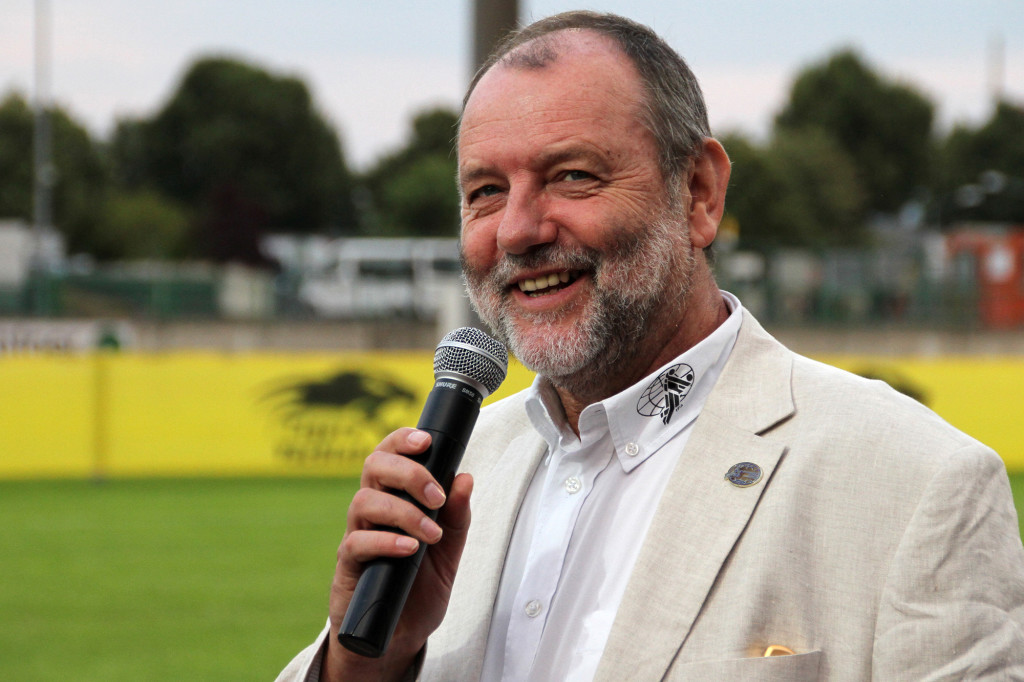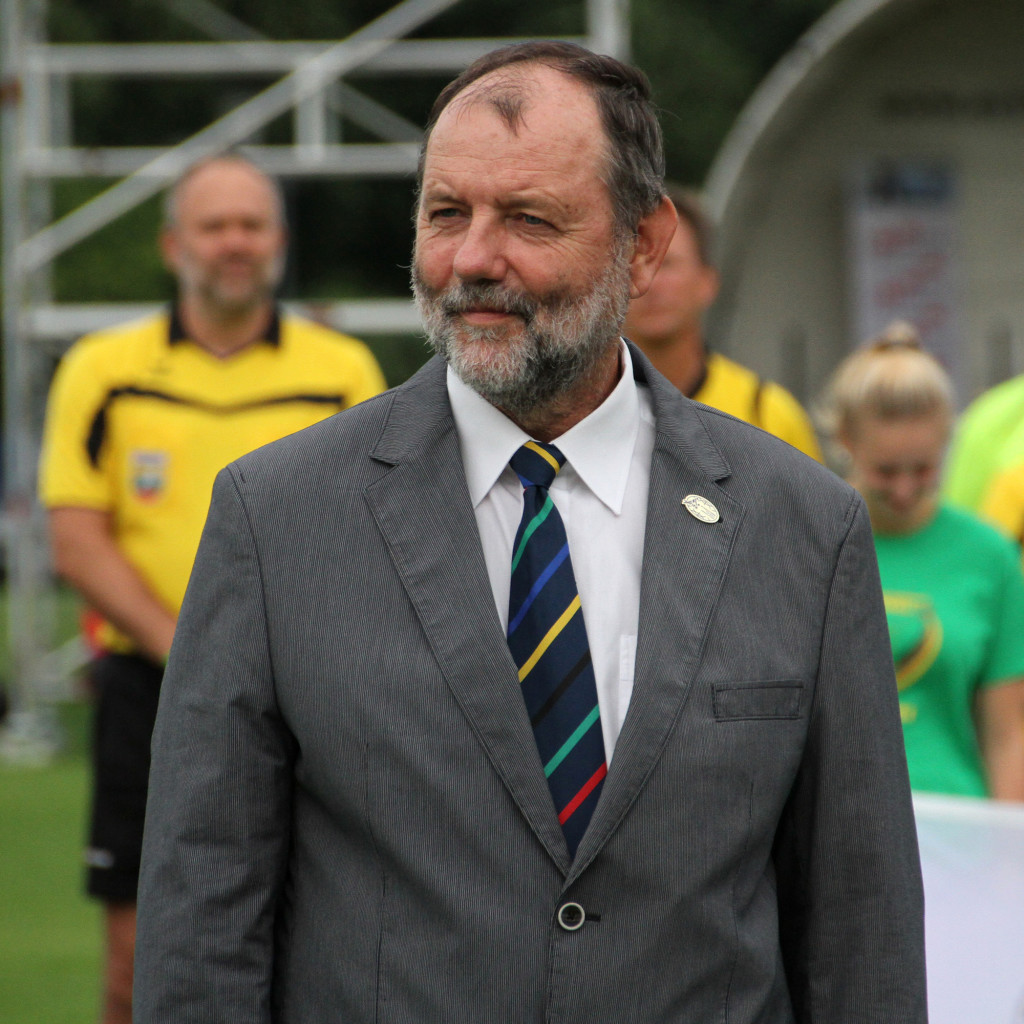ENGLISH VERSION BELOW
Am Montag starten wir mit einer Interviewserie der WM-Teilnehmerländer. Schon heute erzählt uns IFA-Präsident Karl Weiß von den PanAm Games in den USA, den aktuellen Entwicklungen im Faustballsport und seinen Erwartungen für die WM in Córdoba.
IFA: Hallo Karl, du warst jetzt in New Jersey bei den PanAm Games. Faustball in den USA wie können wir uns das vorstellen?
Karl Weiß: Es war eine tolle Veranstaltung in Flanders (New Jersey) die von Gastao Englert, dem Nationaltrainer der Amerikaner, initiiert wurde. Er wollte es schaffen die besten Vereinsmannschaften aus Süd- und Nordamerika in die USA zu holen und das ist ihm eindrucksvoll gelungen. Die Teams haben trotz finanzieller Probleme die Reise gewagt, ich denke auch deswegen weil es gar nicht so einfach ist als Südamerikaner überhaupt ein Visum zu ergattern. Insgesamt waren 18 Vereinsmannschaften (10 Herren, 8 Damen) und je vier Nationalmannschaften dabei.
IFA: Wie war dabei das Zuseherinteresse vor Ort?
Karl: Das hat sich auf die örtlichen Leute begrenzt, der Großteil waren Vereinsmitglieder, der Rest kam aus dem Umkreis der Stadt. Es war aber sehr positiv, dass unter anderem der Bürgermeister anwesend war. Seine erste Frage war gleich: „Wie schaut’s aus? Haben wir eine Chance, dass wir die Weltmeisterschaft 2019 ausrichten können?“ Daran erkennt man, dass die Faustballer mit dieser Veranstaltung auch Aufmerksamkeit in der Politik bekommen haben.
IFA: Und wie sieht es aus mit der Vergabe der WM 2019?
Karl: Bei der WM in Cordoba werden wir beim IFA-Kongress über das Austragungsland der WM 2019 entscheiden. Mit Namibia, Schweiz und USA sind drei Bewerbungen zeitgerecht eingelangt, weitere Schritte werden dieses Wochenende bei der IFA-Präsidiumssitzung besprochen. Ich bin mir sicher, dass wir am Ende eine gute Entscheidung treffen werden.
IFA: Wie steht es denn allgemein um den Faustballsport in Übersee? Der Plan mit der WM 2019 hört sich ja sehr ambitioniert an.
Karl: In den letzten vier Jahren hat sich sehr viel getan. Sowohl bei der Damen WM in Dresden (GER) 2014 und jetzt bei den PanAm Games haben die Nationalteams der USA eine sehr beeindruckende Vorstellung abgeliefert. Sie haben sich das Ziel gesetzt, bei der WM heuer unter die Top 6 zu kommen, das kann man ihnen durchaus zutrauen. In Sachen Jugendarbeit geht schon etwas weiter und unter dem neuen Präsidenten Bob Feid ist auch ein sportpolitischer Fortschritt zu erkennen.
IFA: Also allgemein gesagt, befindet sich der US-Verband auf dem richtigen Weg?
Karl: Richtig, es ist ein richtiges Faustballinteresse da, das man auch für die WM-Bewerbung nützen möchte. Der Sportdirektor der World Games 2021 in Birmingham (Alabama) war vor Ort und wäre durchaus interessiert die Herren Weltmeisterschaft als Pre-Event auszurichten. Bob Feid hat die volle Unterstützung des US-Verbandes für eine WM Bewerbung und die World Games zugesagt. Wenn es um die WM geht könnte auch eine gemeinsame Ausrichtung von New Jersey und Alabama in Erwägung gezogen werden.
IFA: In Kolumbien 2013 war es ja so, dass vor den World Games die Jugend-WM stattgefunden hat. In den USA soll es gleich die Herren-Weltmeisterschaft sein?
Karl: Die Weltmeisterschaften der Damen und Herren müssen unsere Vorzeigeevents schlechthin im Faustballsport sein. Ich lege die Latte für zukünftige Veranstalter sehr hoch, wenn ich an Österreich 2011 denke, muss die WM in etwa den gleichen Charakter haben wir damals. In Flanders müsste bei der Infrastruktur sicherlich noch einiges dazu gemacht werden. Die Frage ist natürlich berechtigt, ob man sich nicht herantasten sollte und zuerst einmal die U18-WM an die USA vergibt.
Es ist aber hervorzuheben, dass das lokale OK-Team der World Games Faustballentwicklungsprogramme unterstützen würde, weil es unbedingt möchte, dass viele Zuschauer bei den Faustballspielen vor Ort sind.
IFA: Das würde sicher auch nachhaltig was bringen für die weitere Entwicklung von Faustball in Amerika.
Karl: Ja, unbedingt. Für den internationalen Weltverband ist ein starkes Amerika ein absolut positiver Faktor. Und es muss eines der IFA-Ziele sein, sich in Zusammenarbeit mit dem US-Verband weiterzuentwickeln – unbedingt.
IFA: Die IFA strebt ja auch die IOC Anerkennung an. Wie sieht es damit aus?
Karl: Ja das ist ein sehr wichtiges Thema. In Zukunft ist die World Games Teilnahme abhängig von der IOC Anerkennung. Deshalb muss es für uns oberste Priorität sein, diese Anerkennung zu erreichen. Wir brauchen dafür neue Statuten und neue Strukturen, ob das alles umsetzbar ist bleibt abzuwarten. Das bedeutet auch, dass die Mitgliedsverbände viel intensiver und vor allem auch tatkräftig mitarbeiten müssen. Wenn dann müssen alle mitziehen, oder auch nicht. Daher werden die nächsten zwei Monate sehr spannend für die Zukunft des Faustballsports.
IFA: Für die IOC Anerkennung ist auch eine gewisse Anzahl an Staaten, die Faustball spielen notwendig. Wie sieht mit der Anwerbung von neuen Mitgliedern aus?
Karl: Wir haben derzeit 50 Länder in denen Faustball gespielt wird, davon sind viele natürlich noch nicht international aktiv. Aber besonders durch die Arbeit von Ernst Almhofer bei der Olympischen Akademie mit Sportlehrern und Politikern, sind viele an Faustball interessierte Länder da. Die spielen eben nur in Schulen, Colleges und Vereinen ohne Verbandsstruktur. Daher müssen sich alle neuen Mitgliedsverbände bei den Behörden als Sportverband registrieren lassen. Die letzten die dazu gekommen sind, sind die Elfenbeinküste und Kenia.
IFA: Das sind ja ganz gute Aussichten.
Karl: Naja, wir müssen in Zukunft das Gefüge der IFA auf viel breitere Beine stellen um gemeinsam den Weg gehen zu können. Denn was haben wir davon wenn sich die Elfenbeinküste anmeldet und sagt: „Ja wir möchten irgendwie einmal Faustball spielen, aber wie können wir da etwas machen, welche Wege können wir gehen?“, wenn ihnen niemand diese Fragen beantwortet. Ich glaube wir haben genau diese Unterstützung in den letzten Jahren verabsäumt. Der Fokus auf den Ausbildungs- und Entwicklungsprogrammen ist eine sehr wichtige Zukunftsstrategie der IFA.
IFA: Was erwartest du dir von der WM in Córdoba, die jetzt im November stattfinden wird? Österreich hat im Jahr 2011 die Latte für zukünftige Veranstalter ziemlich hoch gelegt.
Karl: Man darf sicher nicht davon ausgehen, dass nach der Weltmeisterschaft in Europa, die nächste denselben Standard haben kann. Das geht aus personeller und auch aus wirtschaftlicher Sicht nicht. Wir hoffen, dass entsprechend gute Sportstätten zur Verfügung stehen das wird in den nächsten Wochen vor Ort noch überprüft.
IFA: Wie sieht es aus sportlicher Sicht aus, was ist dein erwarteter Ausgang der WM?
Karl: Man braucht kein Prophet sein, wenn man sagt, dass Deutschland der absolute Topfavorit ist. Die Spitzenteams der letzten WM: Schweiz, Brasilien, Österreich und Argentinien werden versuchen den Deutschen ein Bein zu stellen. Den Titel zu verteidigen ist mit Sicherheit noch ein bisschen schwieriger, als wenn man als Außenseiter ins Turnier geht. Das mussten wir Österreicher 2011 sehr deutlich erleben.
IFA: Und die weiteren Nationen, vor allem die neuen Teilnehmer müssen dann eben schauen, wie sie auf diesem Niveau mithalten können.
Karl: Genau, bei Australien, Südafrika, Indien und Pakistan darf man gespannt sein, wie sie sich schlagen werden. Ich bin mir aber auch sicher, dass wir mit Chile, Namibia, USA und Italien ganz starke Nationen dabei haben. So wie wir 2011 eine enorme Steigerung der Underdogs im sportlichen Bereich gesehen haben, wird dies auch diesmal zu beobachten sein. Es wird mit Sicherheit eine spannende WM werden.
IFA: Dann freuen wir uns auf eine aufregende WM und hoffen das Beste für die Zukunft des Faustballsports. Vielen Dank für das Gespräch.
Karl: Jawohl, vielen Dank.
==========
ENGLISH VERSION
On Monday we start with an Interview Series of all nations participating in the 2015 fistball World Cup. Today the president of the IFA, Mr. Karl Weiss talks about the recent Pan Am Games, the actual developments in fistball and his expectations for the World Championship in Córdoba.
IFA: You have just been to New Jersey to view the 1st Pan American Fistball Games. Fistball in the US, how can we imagine that?
Karl Weiss: It was a great event initiated by Gastao Englert, the coach of the American team. He wanted to bring the best club teams from North and South America to the US and he managed to do that in a rather impressive way. Although the teams faced some financial problems and also struggled to get a visa many made the trip. After all, 18 club teams (10 Men, 8 women) and four national teams took part.
IFA: What can you tell us about the audience at the venue?
Karl: There were mainly locals from the surrounding cities and of course the players themselves. Something we really appreciated was that the mayor from Flanders was among the viewers. His first question was: “Do we have a chance, to host the World Championships in 2019?” I think this shows that the Fistball also got attention in politics with this event.
IFA: And what’s next in the procedure of finding the definite host country for the Fistball World Cup 2019?
Karl: At the World Cup in Cordoba, the IFA congress will decide which country will be hosting the World Cup of 2019. With Namibia, Switzerland and the USA, we got three applications that arrived on time. Further steps will be discussed this weekend at the IFA meeting. I am positive that we will make a good decision.
IFA: What can be said about the fistball sport in general overseas? Planning to host the 2019 World Cup sounds very ambitious.
Karl: In the last four years Gastao Englert and his team did a great job. The performance of the national teams at the Women’s World Cup in Dresden (GER) in 2014 and now at the Pan Am Games, have been very impressive. The Men’s Team has set their goal to rank among the six best teams in Córdoba this year, which sounds realistic to me. There have been many advancements, this can be seen with the young players and under the new president Bob Feid there have also been sports political progressions.
IFA: So in general, the US association is on the right track?
Karl: That’s right, there are many interested and committed people there who also want to use their enthusiasm for the World Championship bid. The sports director of the World Games 2021 in Birmingham (Alabama) was there and would certainly be interested in hosting the Men’s World Championship 2019 as a pre-event. Bob Feid has pledged full support of the US Association for the World Games and the World Championship. When it comes to the World Championship, New Jersey could team up with Alabama as hosts.
IFA: This has also been seen in Colombia 2013, the World Junior Championships were held there before the World Games. Now in the US, the Men’s World Championships could be the pre-event?
Karl: The Men’s and Women’s World Championships must be our model events in fistball. High standards are required for future organizers, thinking back to the event in Austria in 2011, the next World Cup has to have the same quality as it was seen there. In Flanders there would be a lot of work to do in terms of infrastructure. Another question is, of course, if it wouldn’t be better to stage the youth championships first and work one’s way up to the top event. However, the local OC team of the World Games would support Fistball development programs, because they want to have many viewers at the Fistball games.
IFA: That would certainly have an ongoing positive effect for further development of Fistball in America.
Karl: Yes, absolutely. For the IFA, strong American teams and members are an absolutely positive factor. And it has to be one aim of the IFA, to evolve the collaboration with the US-organization – absolutely.
IFA: The IFA also tries hard to get the IOC. Are there any new developments?
Karl: Yes, that’s a very important issue. In the future, the World Games participation depends on the IOC recognition. Therefore, it must be our top priority to achieve this recognition. We need new statutes, new structures; whether all of that is realizable is not sure yet. This also means that the members of the associations must participate more intensively and furthermore must participate in a more active way. Either we are all in or it won’t work. Therefore, the next two months will be very exciting for the future of our sport.
IFA: For the IOC recognition a certain number of nations playing fistball is required. Are there improvements with the recruitment of new members?
Karl: There are currently 50 countries where Fistball is played, of course many of them are not playing on an international level, yet. But particularly the work of Ernst Almhofer at the Olympic Academy with teachers and politicians is very important, many countries are interested in fistball. They start playing in schools, colleges and associations, but without a nationwide structure. Therefore, all new member associations must register themselves as a sports association to the authorities. The last countries that joined the IFA were the Ivory Coast and Kenya.
IFA: These are rather good prospects.
Karl: Well, we have to build the structure of the IFA on a solid wide-spread base to be able to achieve the recognition we long for in the future. What are our achievements when for instance the Ivory Coast says: “Yes, we want to play Fistball somehow once, but how can we do something and which way can we go?”, if no one answers these questions. I think we have failed precisely with this support in recent years. The focus on the training and development programs is a very important strategy in the future of the IFA.
IFA: What do you expect from the World Championship in Cordoba, which will take place in November? Can Argentina keep up with the event in Austria in 2011, which was a quite big?
Karl: We shouldn’t assume that after the World Cup in Europe, the next Championship will have the same standards. This is not possible, starting with the personnel as well as from an economic perspective. We hope that high quality sport facilities are available, this will be hopefully verified in the next few weeks on site.
IFA: What about the tournament from a sports perspective, what is your expected outcome?
Karl: It’s no secret that Germany is the absolute favorite. The top-ranked teams from four years ago: Switzerland, Brazil, Austria and Argentina are trying to outdo the Germans. Defending the title is certainly a little more difficult than going into the tournament as underdog. Austria had to make that painful experience back in 2011.
IFA: And the other nations, especially the new participants, have to get an insight into international events and figure out how they can compete at this level.
Karl: Exactly, there is no way of telling how Australia, South Africa, India and Pakistan will perform at their first big international event. But I am also sure that with Chile, Namibia, USA and Italy we have many strong nations here. As seen in 2011, there are many non-favorite nations who continually improve their play. It will be an exciting championship, for sure.
IFA: We are looking forward to an exciting World Cup and hope the best for the future of fistball. Thank you for the interview.
Karl: Yes, thank you.


 Deutsch
Deutsch
